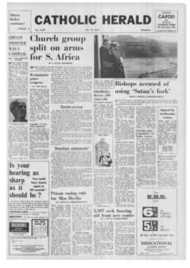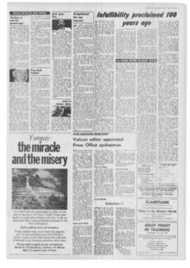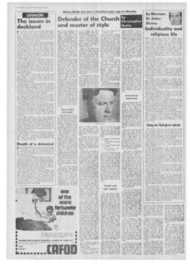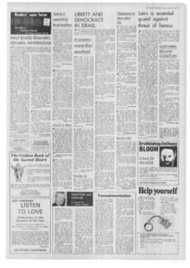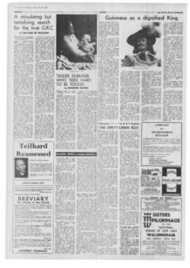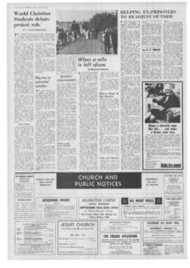Page 3, 24th July 1970
Page 3
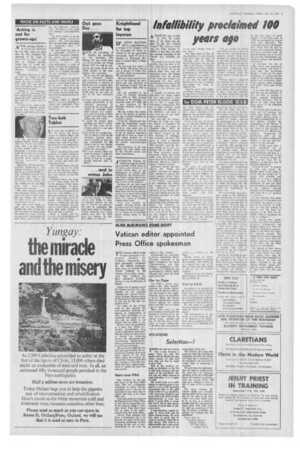
Report an error
Noticed an error on this page?If you've noticed an error in this article please click here to report it.
Tags
Share
Related articles
Alec Guinness
Award For Disney
Why Guinness Is Good For You
Don't Take From M.o.h. Moral Guide
The Conversion Of Alec Guinness
'Acting Is not for grown-ups'
AFTER playing Charles I in Cromwell (reviewed by our film critic on page six). Sir Alec Guinness has returned to the stage in Time Out Of Mind, a new play by Bridget Boland, which had its world première at the Yvonne Arnaud Theatre. Guildford, last week.
Betweeen rehearsals he told me that he wished he had become a writer. "To create on paper, be able to travel and take work with you and be your own master—that for me would have been ideal.
"Acting is an adolescent craft—not for grown-ups. I'm not frighteningly interested in acting any more. And you will find very few actors over 45 who are.
"1 took to the stage in the first place, I suppose, simply because there was nothing I could do well that would make me happy."
Of his partnership with Bridget Roland. which began with The Prisoner in 1954 he said : "She is an ideal writer to have around when we arc rehearsing. A sentence may go badly for an actor or a director may ask for more lines at a particular point. Bridget will oblige quickly and efficiently.
Educated at the Sacred Heart Convent, Roehampton, and Oxford University, Bridget Boland has scripted 30 films to date, including Gaslight, War and Peace and Anne of the Thousand Days. which won the Golden Globe Award and was nominated for an Oscar and the American Screenwriters' Award.
Her stage successes include The Damascus Riede, Temple Folly, The Return and Gordon. She has written two novels, The Wild Geese and Portrait of a Woman in Love.
Her latest work brings Sir Alec and his son Matthew together in a play for the first time. Matthew has been acting for about four years. "I think we were rather apprehensive of each other's presence for the
first few rehearsals," said Sir Alec. He plays a very small part, though a very important one."
The play's themeis on the problem facing modern society: the ever-expanding field of knowledge demanding an increasing sense o f responsibility.
Sir Alec plays the part of an apparently ord in a ry laboratory storeman assistant; his arrival at a scientific research establishment — the setting for the play—precipitates a crisis of public and private conscience. The play, then, is larded with irony; it is a cutting comment on our so-called ad v a nce civilisation.
Sir Alec said he was pleased his son was doing well, but "of course. I never wanted him to be an actor." Well, after all, the average wage in the acting profession in this country is £12 a week. Almost all the time four fifths of the profession are out of work.
"Things might be slightly better if we were classified as rogues and vagabonds. Then we would not have to pay income tax."
Two-bob Tablet
UP goes the circulation of the Tablet, the weekly review of Church affairs and politics, and up goes its price. Last week's issue devoted a column and a half of its Notebook feature to an explanation of its price increase from Is. 6d. to 2s.
Editor Tom Burns this week declined to reveal circulation figures. but said they had remained steady after the last price increase and were currently increasing.
The increase means that the Tablet will sell at the same price as the Spectator but at 6d. more than the New Statesman, now known as the Old Grossman.
Nntehook blames the rising cost of wages. paper and ink for the increase. It then waxes somewhat cryptic: "It seems to us much better to spread the risk of this enterprise in the terms of a few shillings to individual subscribers than to go to any large single source of capital, which would he prepared to assume the risk but would then, naturally, have the right to dictate policy, possibly along lines quite foreign to those pursued at present."
What. I wonder will the Universe, the old stablemate of the Tablet. make of that?
Out goes
Des . . .
SINCE the launching of Shelter, the campaign for the homeless, Des Wilson, 29, has rarely been out of the public eye. From March 1971 he will be taking up the cause of an even wider section of the community—the consumer.
He is to be the new director of the Consumer Council with a salary of £6,500 a year. His resignation as director of Shelter was not a sudden decision. He promised the Shelter team in October 1969 that he would leave by the time he was 30. He now elaborates why: To break with the tradition of leading personalities in the voluntary movement of staying on for too long and failing to recognise when their energies and enthusiasm were no longer at their height, and when they were falling into bad habits.
To avoid the danger after speaking out about a problem for four years of becoming ineffective and even a national bore.
As he would be arguing forcibly for greater unity in the voluntary housing movement he would not want the case undermined by the charges that he was seeking to increase his own power within the movement.
There were various ideals for which he wished to fight for on a wider front than that offered to him by a singleminded platform such as Shelter.
. and in comes John
The new director of Shelter will be John Willis, 51, who, as Housing director for the past 15 months, has played a key part in campaigns. He spent many years at Magdalen College managing their urban estates, and after the 4965 Rent Act became the first Rent Officer in Oxford.
Knighthood for top layman
DR. KEVIN MACDON NELL's appointment as a Knight of St. Gregory will be welcomed by those involved in the lay apostolate movement. Aged 49, he is a lecturer in Economic History at Queen Mary College, London.
He has long been active in the World University Service and is warden of Lilian Penson Hall, which accommodates 500 post-graduates.
He has a long record of service in the Catholic lay apostolate and was chairman of the National Council for the Lay Apostolate from 1965 to 1970.
He was president of the Tinian of Catholic Students from 1949 to 1950, national secretary of the Newman Association from 1957-1960, and a past chairman of the National Catholic Youth Association.
He has written two books, one on the history of Middlesex and a school textbook on economic history.
It was Dr. MacDonnell who made the imaginative suggestion while chairman of the N.C.L.A., that some sort of machinery similar to P.A.Y.E. be set up whereby employees could opt to have so much of their wages stopped out of their pay packets to go towards the world's under-developed countries.
The promotion of this suggestion has been taken over by the Church's Justice and Peace Commission.
ALTHOUGH bridging the intellectual gap by providing a popular weekly series of Thursday night lectures at 15 Carlisle Street, Soho, on the implications of present day Catholicism, the London Newman Circle realises that it has neglected to bridge the hunger gap of some of its members.
Lectures do not start until eight o'clock and although the bar opens half an hour beforehand those who live too far out of town to go home for a meal are faced with having to kill some two hours in Central London after work.
From now onwards the London Newman Circle will provide bread and cheese every Thursday evening to give members a chance to be refreshed before settling down to the lecture.
blog comments powered by Disqus


